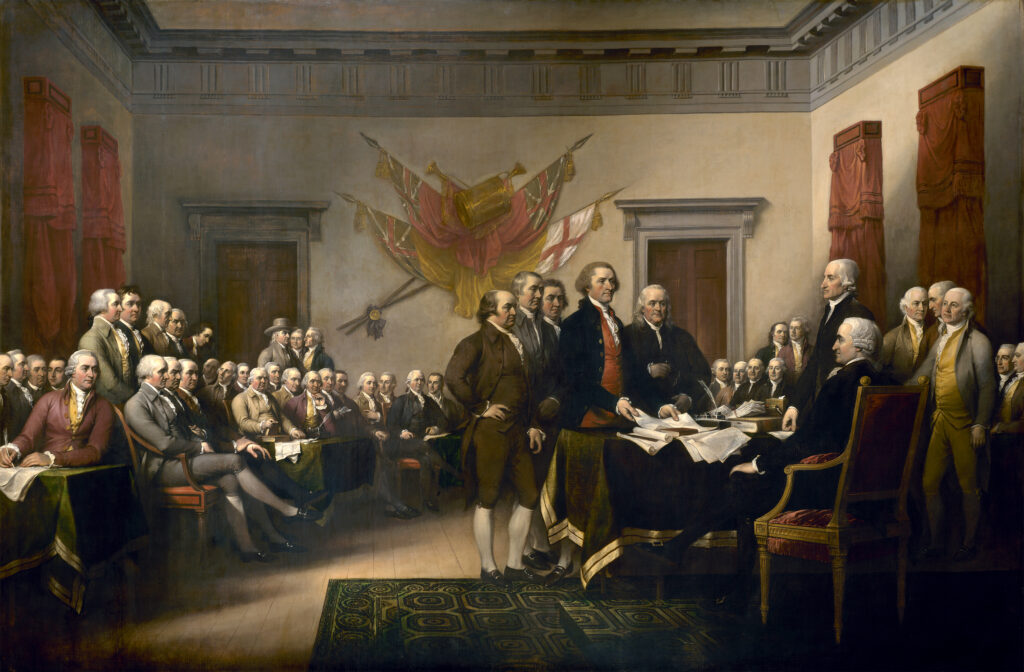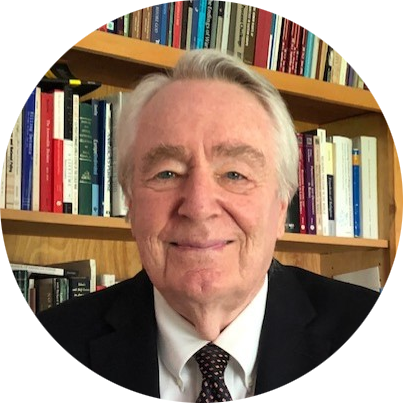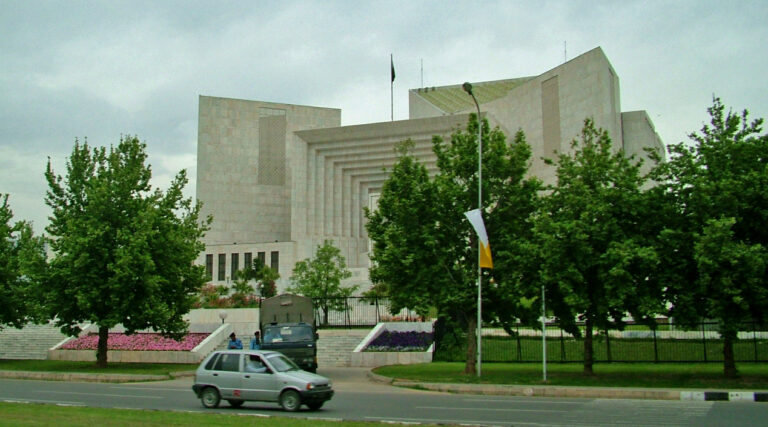
Is Anything Sacred?
Trump and the Truths We Hold
David Little
John Trumbull’s painting, Declaration of Independence, (PD-Art).
In a recent newsletter to Atlantic subscribers, editor Jeffrey Goldberg refers to the cover story by Ashley Parker and Michael Scherer. They attempt to answer, he says, a simple question: How did Trump rise from political ruin in 2021 to seize the commanding heights of government and the world economy? In answering the question, they describe Trump’s belief “that no stove is too hot to touch” and “that normative reality does not exist.”
This explanation for what we might call Trump’s “resurrection” after his defeat in 2020 is telling. It amounts to his thinking and acting as though nothing is sacred. “No stove is too hot to touch” means no subject people hold dear is too precious to be attacked, and “normative reality does not exist” means ideas like truth, goodness and rightness have no objective, universal validity.
Recall the characteristics that make up the word, sacred: supernatural or set apart from what is secular, profane or natural; entitled to special reverence or respect; unassailable, inviolable, meaning not invented or constructed by human beings, but to be taken as given and not to be tampered with. Synonyms for sacred are religious and holy.
It may be going too far to say Trump holds nothing sacred. On occasion, he mentions the Christian God and the Bible, and he frequently commends the religious beliefs and practices of the large portion of the evangelical community that supports him, especially the “Christian nationalists.” Whether he himself is committed to what they espouse is difficult to determine, since he seldom spends time talking about what he believes in. He is too busy insulting the convictions and behavior of people he regards as enemies, or acting in ways that threaten beliefs and institutions widely considered to be of great value.
But whatever Trump believes or not, his deportment does raise for us the question whether anything is, after all, sacred. One way to find out is to reflect on what he has done in the early days of his second administration. The key point: Trump is waging an attack on basic rights that are at the center of the American experience .
Pardoning more than 1,500 people, many of whom were found guilty of serious assault, claiming without proof that they were unjustly convicted, flagrantly disregards the violation of the rights of those individuals killed, injured, or violently harassed. Due process of law, guaranteed by the Fifth and Fourteenth Amendments, was denied the victims of the January 6 insurrection, and it was grossly subverted by the inexplicable pardon of those charged and convicted of violating victims’ rights.
The same threat to the right of due process applies to the deportation to the infamous CECOT prison in El Salvador of immigrant Venezuelans and others, like Abrego Garcia, as well as in the case of the dismissed federal employees. The right of due process is also at issue in the case of the revoked visas of the international students, as is the right of free speech. In the cases of Mahmoud Khalil and Rumeysa Ozturk, the rights of due process and free speech are in question, as, in addition, is the right of habeas corpus that is enshrined in Article I of the Constitution. The resistance within the Department of Justice to the mandated investigation of student protesters is based on the conviction that such an investigation would threaten the students’ right of free speech, as well as that of all persons, citizen or not, who are promised protection under the U.S. Constitution.
Trump’s executive order against birthright citizenship for children of undocumented or temporary residents of the US is a clear threat to a right that is unrestricted in the Fourteenth Amendment, and by subsequent rulings of the Supreme Court. This is a particularly critical right, since it means that simply on the basis of birth or naturalization, citizenship and all “the privileges and immunities” pertinent to it are guaranteed to all people without regard to race, gender, religion, national origin, or status.
Rights versus Arbitrary Government
It is important to consider briefly the history of the legal recognition of individual rights like due process, freedom of speech, and birthright citizenship. That history exhibits a long, very arduous, and expanding effort to restrain arbitrary power and force, power and force directed by whatever the sovereign authority happens to think desirable.
In the American case, there is, to be sure, the important influence of British common law. Sealed in 1215, Magna Carta restricted the power of King John, as demanded by the knights of the realm. It had a direct influence on the Bill of Rights of the U.S. Constitution as regards due process, including rights to confront accusers and receive a speedy public trial by jury, and not to be subjected to cruel and unusual punishments.
In 1628, the English Parliament passed the Petition of Right, which limited royal power even more strictly. The monarch might not levy taxes without the consent of Parliament and might not detain prisoners without a valid reason (right of habeas corpus). The monarch also could not invoke martial law in peacetime, meaning the monarch could not suspend the rights of citizens by baselessly declaring that the country was under attack.
Then, again, in 1689 the English Parliament adopted a Bill of Rights that imposed still more restrictions. It expanded the number of individual rights such as the right to petition the government, to bear arms in self-defense, and be protected from excessive bail. It also called for regular elections and established the supremacy of Parliament as the highest authority in the land.
The influence of British common law on America was important in the effort to restrain royal power, but it does not quite explain what the idea of rights has come to mean for Americans. The patriots frequently did blame Parliament and George III for failing to enforce their rights as British citizens, but statements by founders like Thomas Jefferson and James Madison added a new understanding. In July 1774, Jefferson sternly refuted the resolution of freeholders of Albemarle County, Virginia, favoring submission to British law, claiming that the basis of the legislation Americans consent to is not British law but “the common rights of mankind,” a much more universal notion.
Madison worried that basic rights were not adequately protected, since British common law restrained only the Crown, not the Parliament, Parliament being the highest authority in the land. American people are “most alarmed,” he said, by the inadequacies of British law on that score, and, in the American system, by contrast, “the great and essential rights of the people are secured against the legislature as well as the executive” by means of a written constitution, eventually including a bill of rights Madison helped write, that stands above all the activities of government.
This leads to some observations about the Declaration of Independence and the way it portrays the subject of rights. Recall the familiar words: “We hold these truths to be self-evident, that all men are created equal, that they are endowed by their Creator with certain unalienable Rights, that among these are Life, Liberty, and the Pursuit of Happiness, That to secure these rights, Governments are instituted among Men, deriving their just powers from the consent of the governed,—That whenever any Form of Government becomes destructive of these ends, it is the Right of the People to alter or abolish it, and to institute new Government, laying its foundation on such principles and organizing its powers in such form as to them shall seem most likely to effect their Safety and Happiness.”
There then follow some general charges and numerous specific accusations against King George III. The Declaration speaks of “a long train of abuses and usurpations evinc[ing] a design to reduce [his colonial subjects] under absolute Despotism,” which a few sentences later is referred to as, “absolute Tyranny.” The gist of the charges is the King’s “invasions on the rights of the people,” manifested by his arbitrary disregard of existing laws and judicial and governmental standards, his wanton misuse of military force, and his capricious economic policies such as “imposing Taxes on us without our Consent” and “cutting off our Trade with all parts of the world.”
The underlying structure of argument rests on the logic of the right of self-defense. It is morally justifiable to use force to defend against an arbitrary attack so long as the response conforms to certain conditions. The attack must be imminent and defensive force therefore necessary since peaceful attempts to avert the attack have been exhausted. Defensive force must also be proportional, meaning it is least costly in lives and destruction, and without malice, or lacking an intention to inflict harm on the aggressor beyond what is required to thwart the attack.
The drafters believed the colonists were justified in mounting an armed rebellion against George III because the colonists had come to the end of their rope. They still smarted from the King’s abrupt rejection of the Olive Branch Petition presented to him in July 1775, something that was, they thought, a generous and good faith effort to avert armed conflict. That recollection lies behind the words, “Such has been the patient sufferance of these Colonies, and such is now the necessity which constrains them to alter their former System of Government.” A long-suffering attitude of that kind is much in spirit of the right of self-defense.
Incidentally, the vigorous debate among historians over whether the American Revolution lived up to the conditions of the right of self-defense does not discredit the exalted status the right occupied in the minds of the founders. It constitutes an inviolable standard for holding to account all cases of armed combat, including the War of Independence.
Following the logic of self-defense, the drafters of the Declaration understood that the colonists were not only entitled to defend themselves against England—forcibly, if necessary—but were also obligated, after the revolution was over, to create a new government arranged against despotism and tyranny by protecting “certain unalienable rights.” “Among these,” says the Declaration, “are Life, Liberty, and the pursuit of Happiness,” suggesting that the list of rights yet to be enumerated in a future Constitution and Bill of Rights, entrenching things like due process, equal treatment under the law, and freedom of speech, should all further add to the means needed to prevent the return of “Arbitrary government.”
Sacred and Secular Rights
As Danielle Allen indicates in her book, Our Declaration: A Reading of the Declaration of Independence in Defense of Equality, Jefferson’s original draft made no mention of divine authority, and the four references to it, including the familiar words, “endowed by their Creator,” were provided by John Adams and members of a Congressional committee authorized to make corrections in the draft. Notably, Jefferson’s original phrasing was different from the final text. “We hold these truths,” he wrote, “to be sacred and undeniable,” and he repeated a similar statement in the slavery passage that was omitted by the Congressional committee because of the sensitivity of the subject. It was Benjamin Franklin who substituted the words, “We hold these truths to be self-evident,” clearly intending a more secular reading.
There is, it would appear, a deep and revealing ambivalence in the understanding of rights in the Declaration of Independence. On the one hand, the idea of “self-evidence” does suggest a secular or natural understanding. The rights mentioned and implied can be recognized, the founders thought, by natural human reason and experience without assistance from a sacred source, and that understanding is reasonable.
It is difficult for any human being in any culture to deny, as a matter of simple reflection, the moral wrongness of acts of arbitrary force—acts, that is, that inflict death, injury, imprisonment or other forms of severe distress in the interest of attaining or preserving wealth and power for oneself or one’s group. It also seems to follow “self-evidently” that rights protected by the U.S. Constitution prohibiting arbitrary arrest and detention or coercive suppression of speech or other peaceful acts of dissent are essential means for defending against arbitrary domination.
It is important to note that this notion of self-evident rights assumes equal freedom. When literally no one, including a political leader, is permitted to use force out of self-interest or personal whim against the life, liberty, and cherished opportunities of others, everyone is thereby equally free from arbitrary domination. That would seem to be the fundamental ideal of the Declaration.
On the other hand, while the idea of self-evidence, so understood, leaves out one defining characteristic of sacred namely, something “supernatural or set apart from what is secular, profane or natural,” it still includes others, namely, that which is “entitled to special reverence or respect; unassailable, inviolable, meaning not invented or constructed by human beings, but to be taken as given and not to be tampered with.”
We have, then, discovered a deep and revealing ambivalence regarding the interpretation of rights in the drafting of the Declaration of Independence. That ambivalence is apparent in the way Jefferson was drawn toward a sacred understanding while not mentioning a divine source, as it is in the way Benjamin Franklin favored a more secular understanding while John Adams and members of the Congressional committee felt the need to add sacred references. The founders could not make up their minds, it seems, because idea of rights was for them inescapably secular and sacred at once. ♦

David Little is at present a research fellow at the Berkley Center for Religion, Peace, and World Affairs at Georgetown University, having served before that as Professor of the Practice in Religion and International Affairs at Harvard Divinity School, and as Senior Fellow in Religion, Ethics, and Human Rights at the United States Institute of Peace. In 2015, Cambridge University Press published Essays on Religion and Human Rights: Ground To Stand On, and a book of responses to his work by colleagues and former students: Religion and Public Policy: Human Rights, Conflict, and Ethics, ed. by Sumner B. Twiss, Marian Gh. Simion, and Rodney L. Petersen.
Recommended Citation
Little, David. “Is Anything Sacred? Trump and the Truths We Hold.” Canopy Forum, June 12, 2025. https://canopyforum.org/2025/06/12/is-anything-sacred-trump-and-the-truths-we-hold/.
Recent Posts










